![]()
![]()
![]()
Use LEFT and RIGHT arrow keys to navigate between flashcards;
Use UP and DOWN arrow keys to flip the card;
H to show hint;
A reads text to speech;
19 Cards in this Set
- Front
- Back
|
Internationale Entwicklungspolitik
Entwicklung und Armut |
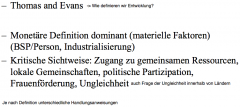
|
|
|
Internationale Entwicklungspolitik
Entwicklung und Armut Armut |
- The monetary-based conception of poverty has been almost universalized among governments and international organizations since 1945
- Poverty is interpreted as a condition suffered by people - the majority of whom are female - who do not earn enough money to satisfy their basic material requirements in the marketplace - Developed countries have regarded poverty as being something external to them and a defining feature of the Third World. This view has provided justification for the former to help 'develop' the latter by promoting further integration into the global market - However, such poverty is increasingly endured by significant sectors of the population in the North, as well as the Third World, hence rendering traditional categories less useful - A critical alternative view of poverty places more emphasis on lack of access to community-regulated common resources, community ties, and spiritual values - Poverty moved up the global political agenda at the start of the twenty-first century, but the 2008/9 'credit crunch' promises to reverse some of the early success |
|
|
Internationale Entwicklungspolitik
Entwicklung und Armut Development |
- Development is a contested (umstritten) concept. The orthodox or mainstream approach and the alternative approach reflect different values
- Development policies over the last sixty years have been dominated by the mainstream approach - embedded liberalism and, more recently, neo-liberalism - with a focus on growth - The last two decades of the twentieth century saw the flourishing of alternative conceptions of development based on equity, participation, empowerment, sustainability, etc., with input especially from NGOs and grass-roots movements and some parts of the UN - The mainstream approach has been modified slightly and has incorporated the language of its critics (e.g. pro-poor growth) - Gains made during the last two decades may be reversed as the full consequences of the global 'credit crunch' emerge |
|
|
Internationale Entwicklungspolitik
IB und die dritte Welt |

|
|
|
Internationale Entwicklungspolitik
Entwicklungstheorien / Ideen? |

|
|
|
Internationale Entwicklungspolitik
Internationale Organisationen nach dem 2. WK |

|
|
|
Internationale Entwicklungspolitik
Internationale Organisationen nach dem 2. WK Die Debatte in Lateinamerika |
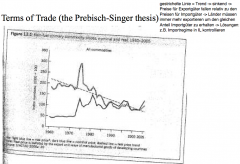
|
|
|
Internationale Entwicklungspolitik
Internationale Organisationen nach dem 2. WK Die Debatte in Lateinamerika Dependenztheorien |

|
|
|
Internationale Entwicklungspolitik
Internationale Organisationen nach dem 2. WK Bretton Woods Institutionen (1950-1960) |
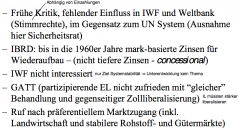
|
|
|
Internationale Entwicklungspolitik
Internationale Organisationen nach dem 2. WK Steigende Systemkritik |

|
|
|
Internationale Entwicklungspolitik
Internationale Organisationen nach dem 2. WK Die Bretton Woods Institutionen reagieren |

|
|
|
Internationale Entwicklungspolitik
Entwicklungspolitik: Paradigmenwechsel (80er Jahre) |

|
|
|
Internationale Entwicklungspolitik
Entwicklungspolitik: Paradigmenwechsel (80er Jahre) Der Washington Konsensus entsteht |
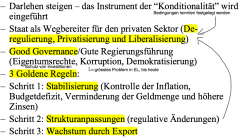
|
|
|
Internationale Entwicklungspolitik
Entwicklungspolitik: Paradigmenwechsel (80er Jahre) Der Washington Konsensus entsteht Die Debatte punkto “Globalisierer” |

|
|
|
Internationale Entwicklungspolitik
Entwicklungspolitik: Paradigmenwechsel (80er Jahre) Der Washington Konsensus entsteht Die Debatte punkto “Globalisierer” Identifying Globalizers |
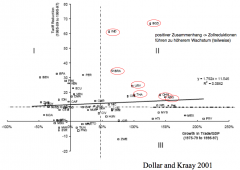
|
|
|
Internationale Entwicklungspolitik
Entwicklungspolitik: Paradigmenwechsel (80er Jahre) Der Washington Konsensus entsteht Washingtoner Konsens oder Washingtoner Konfusion? |
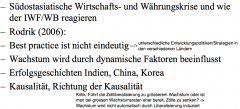
|
|
|
Internationale Entwicklungspolitik
Entwicklungspolitik: Paradigmenwechsel (80er Jahre) Der Washington Konsensus entsteht The Augmented Washington Consensus |
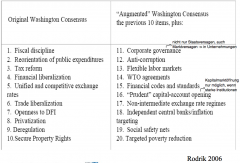
|
|
|
Internationale Entwicklungspolitik
Weitergehende Herausforderungen |
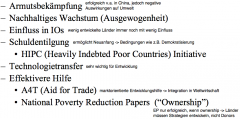
|
|
|
Internationale Entwicklungspolitik
Forschungsfragen: |

|

